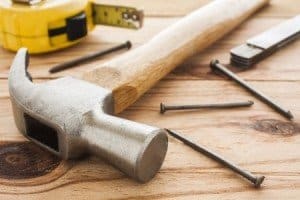Is Remodeling Your House Worth Borrowing For?

If you’re considering taking out a loan, putting a remodel on a credit card, or otherwise financing an upgrade to your home, think carefully about whether the remodel is actually worth borrowing for.
Here are seven key questions to ask yourself before you decide to borrow for a remodel.
1. Is the remodel absolutely essential?
If your home has safety or health issues, a remodel or upgrade isn’t optional. If your deck is a safety hazard and your guests are in danger of falling off it, a remodel is essential — and you’ll have to borrow if you can’t pay out of pocket.
Ask yourself if the remodel is really necessary, though. A new child may make you feel the need to build a home addition with another bedroom. But many kids do fine with sharing. The addition would be convenient, but not essential.
2. What will the return on investment (ROI) be?
Some homeowners justify the cost of borrowing based on a belief that the remodel will add value to the house. While some upgrades make your home easier to sell or help you fetch a higher price, this isn’t always the case.
For example, adding a pool could turn off as many buyers as it entices. This is especially true if you live where pools aren’t used year-round and if they’re not common in your neighborhood.
Even when a project increases the value of your home, you’re unlikely to get back the full amount you spent on the upgrade. According to Remodeling.com, you get one of the best ROIs with a minor kitchen remodel in 2019. But even this project typically allows you to recoup only 80.5% of what you spent. A major kitchen remodel, on the other hand, will only recover 62.1% of spending for a midrange project — and 59.7% for an upscale remodel.
If you’re going to lose much of what you spent and you add borrowing costs on top of that, you’ll be way in the red.
3. Are you over-improving for the neighborhood?
Let’s say you live in a neighborhood full of modest starter homes. Should you upgrade your house to a lavish mansion? It might seem like a good idea, but it could be very hard to recoup the cost of the upgrade.
Over-improving a home is one of the worst mistakes any homeowner can make. Borrowing to over-improve is expensive and makes your home harder to sell. It’s doubly bad.
4. How long do you plan to live in your home?
If you plan to live in your home for a long time, it may be worth borrowing to make it more comfortable. Of course, the longer you live in the house, the more dated the remodel will become. That adds less value to your home when you sell — so you recoup less of what you spent.
What about if you’re going to stay in your home for a short time? Remodeling may be beneficial if it brings your house up to par with your neighbors. A remodeled home may sell faster and for more money.
But you still probably won’t recoup the costs. If you’re thinking of remodeling for resale, it’s best to talk with local realtors about which upgrades are worth doing and which would be a waste of money.
5. What are your other options?
Sometimes a major remodel costs as much or more than moving to a new home. Moving could make more sense in these cases, especially if you’d be over-improving your existing house.
In other situations, minor tweaking could make your home more comfortable and attractive than a remodel. If you can scale down your aspirations, pay in cash, and be just as happy with the project, take this option instead of borrowing for more substantial upgrades.
6. Does your remodel come with long-term costs?
In some cases, remodels cause you to incur ongoing costs. If you add a pool, for example, you’ll have to pay for chemicals and maintenance. Making major improvements to your home could increase your property taxes. Adding an extension could make your utility costs go up, too.
When your remodel adds costs and you borrow for it, it may be difficult to afford your new monthly obligations. Don’t stretch your budget so far that paying for your remodel makes it impossible for you to accomplish other financial goals.
7. How is your credit?
If you have good credit, you may be able to qualify for a low-interest loan or a credit card with a 0% promotional rate. These make borrowing for remodels more affordable. If you have poor credit, though, borrowing for a remodel will be more expensive — which could mean it’s not worth doing.
Many lenders allow you to get pre-approved and find out likely loan terms before formally applying for a loan and having your credit checked. See what rates you’d qualify for and how much borrowing would cost you before deciding to move forward with a remodel loan.
Now you can decide if borrowing to remodel your home is worth it
Is remodeling your house worth borrowing for? It depends on
- the potential ROI of the project,
- whether you’re remodeling to fix a safety issue,
- whether you’re over-improving for the neighborhood, and
- the type of loan you can qualify for.
Carefully consider these factors before taking out a loan to remodel. If borrowing isn’t the right choice, start saving up to do the project instead.
Source: fool.com















 Accessibility
Accessibility